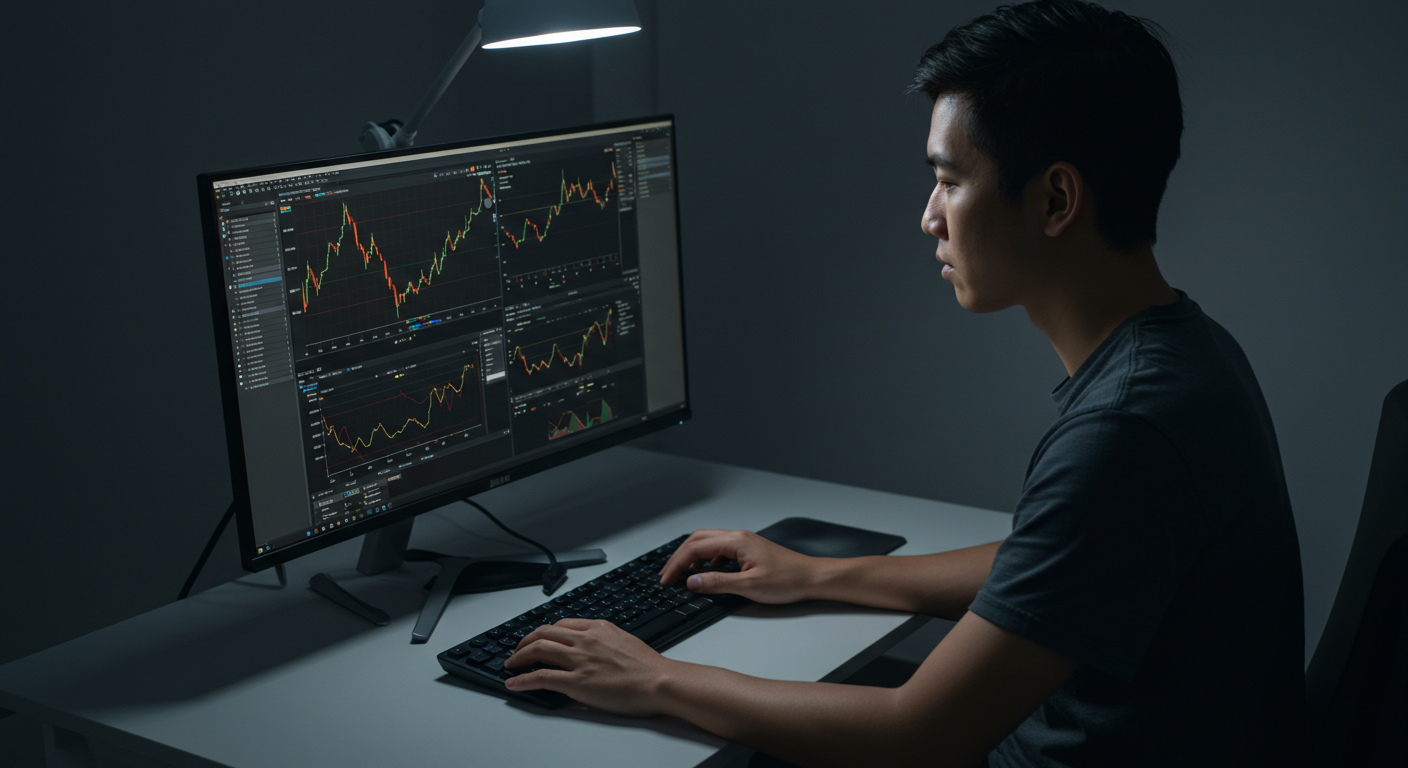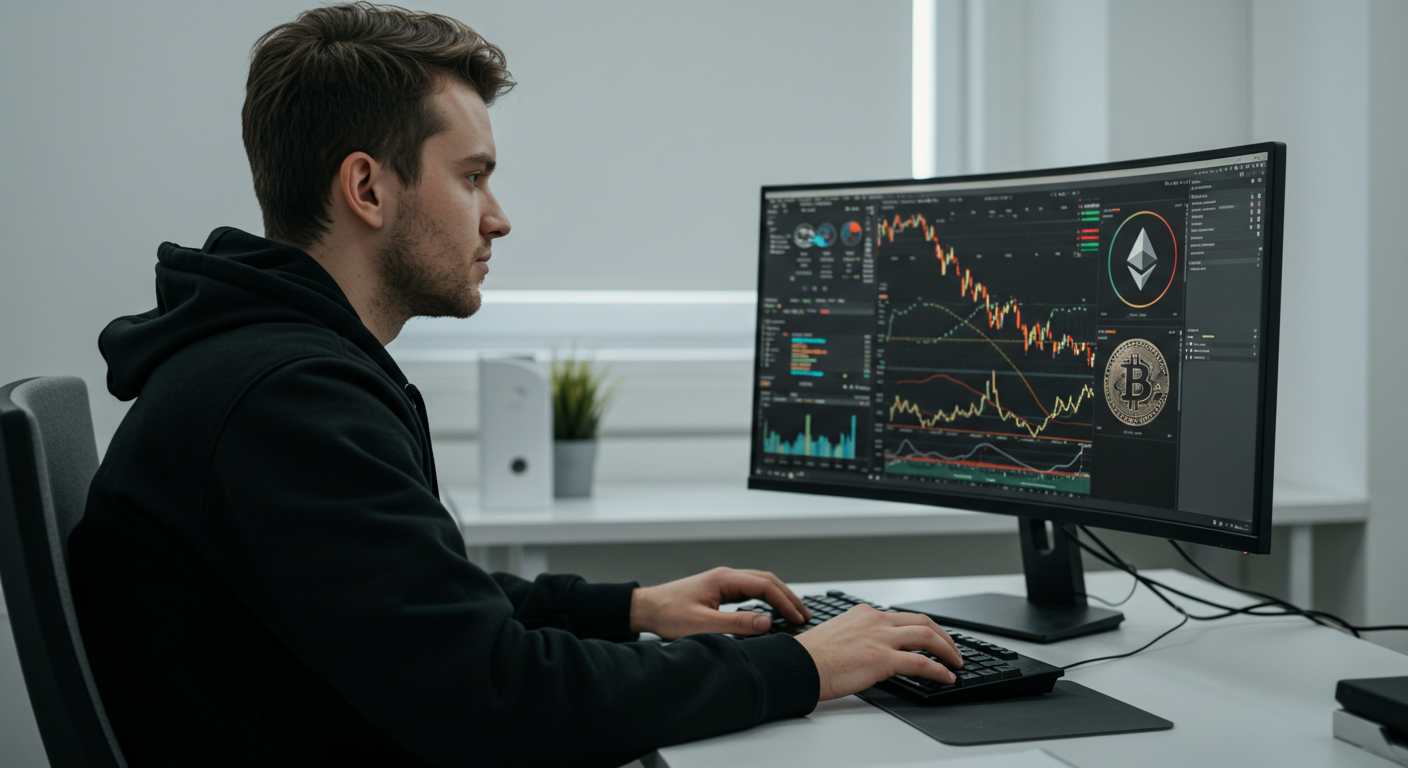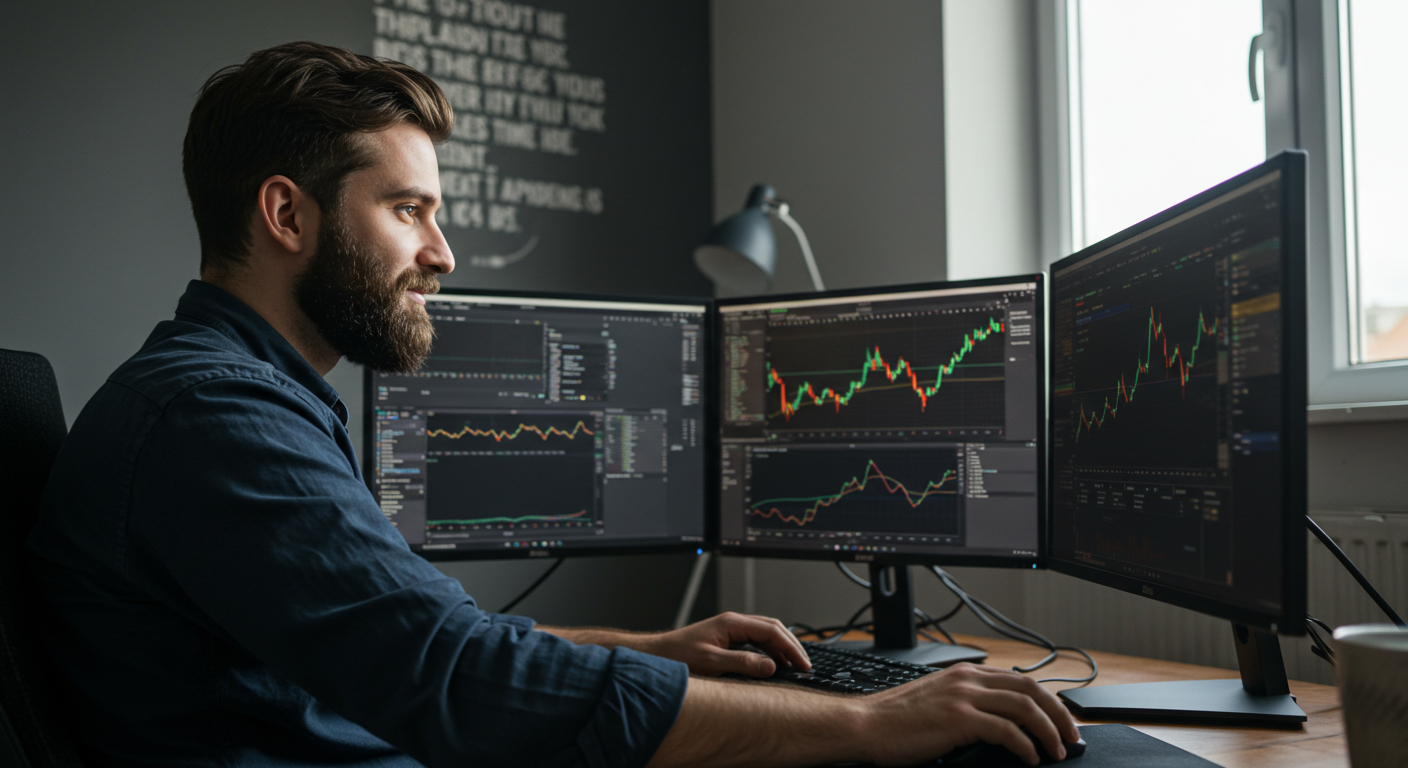Every day, more traders use CFD brokers to gain exposure to both crypto and traditional markets without owning the underlying asset. These platforms have become a top choice for anyone looking to speculate on price moves, especially as interest from Web3 traders and creators grows.
With quick access and flexible tools, CFD brokers fit perfectly into the world of cryptocurrencies and blockchain projects. This guide breaks down the essentials so you can trade smarter and stay ahead in the new era of online finance.
What Are CFD Brokers?
CFD brokers are companies or platforms that let you trade Contracts for Difference (CFDs).
Instead of buying the actual asset like a stock or a cryptocurrency, you’re dealing with a contract that tracks the price movement of that asset. This means you can profit from the rise or fall of prices without owning the asset itself.
Unlike traditional brokers who focus on buying and selling physical assets, CFD brokers offer more flexibility. They make it easy to take long (buy) or short (sell) positions, letting you act on bullish or bearish views.
This approach is especially popular among traders interested in crypto, forex, and other fast-moving markets, as it allows quick access to global markets with just a few clicks.
How CFD Brokers Operate
CFD trading works on the principle of speculation. When you trade CFDs, you agree to exchange the difference in an asset’s price from the point you open your trade to when you close it. If the price moves in your favor, you earn a profit. If it moves against you, you take a loss.
Here’s how the process typically works:
- Leverage: CFD brokers let you trade using leverage, which means you only need to put down a fraction of the trade’s full value (called margin). This can boost both profits and losses, so it’s important to use leverage carefully.
- Margin: When you open a position, you deposit a “margin”, a small percentage (e.g., 5-10 percent) of the total trade size. The broker usually holds this amount as security.
- Opening and Closing Positions: To open a CFD trade, you decide whether you think the price will go up or down. If you think it will go up, you “go long.” If you expect a drop, you “go short.” The position stays open until you decide to close it, and your profit or loss is based on the change in value.
CFD brokers typically make money through spreads (the difference between the buy and sell price) and sometimes by charging commissions or overnight fees. This model gives you flexibility to trade anytime without actually owning any physical coins, shares, or commodities.
Types of Assets Offered by CFD Brokers
One of the biggest draws of CFD brokers is access to a broad set of markets, all in one place. You don’t need separate accounts to trade stocks, crypto, forex, and more. Here are the main asset types you’ll find:
- Cryptocurrencies: Popular coins like Bitcoin, Ethereum, and emerging altcoins can be traded 24/7 via CFDs. This is ideal for traders looking to speculate on price swings without dealing with wallets or direct ownership.
- Forex (Foreign Exchange): Major, minor, and exotic currency pairs are all available. The forex market is known for its liquidity and high trading volumes.
- Stocks: CFDs let you trade global shares, from top US tech companies to European blue chips, without owning the underlying stocks.
- Commodities: Get exposure to gold, oil, natural gas, and even agricultural products. Commodities can add variety to a trading portfolio.
- Indices: You can also trade CFDs based on indices, like the S&P 500 or NASDAQ, for broader market exposure.
- ETFs and Bonds: Some platforms offer CFDs on exchange-traded funds and government bonds, further increasing choice.
Because of this range, CFD brokers have become a key part of the trading toolkit, especially for those who want to keep up with the fast-changing nature of crypto and Web3 markets.

Key Features to Look for in CFD Brokers
Choosing between dozens of CFD brokers is no small task. The difference between a smooth trading experience and avoidable headaches often comes down to three main areas: security, platform flexibility, and cost structure.
Each broker promotes unique features, but knowing which ones matter most especially for crypto, DeFi, and Web3 traders, separates a safe, efficient pick from a risky guess.
1. Regulation and Security of CFD Brokers
Regulation and security are the bedrock of any solid CFD broker. To keep your funds and personal information protected, always verify where your broker is licensed.
Well-regulated brokers operate under strict guidelines from agencies like the FCA, CySEC, or ASIC, which means tighter controls on client funds, better transparency, and a higher bar for ethical conduct.
When trading crypto CFDs, the risks run even higher due to scams and unregulated offshore brokers. Make it a habit to check regulator registration numbers and privacy policies. Look for two-factor authentication and end-to-end encryption as default security features.
To stay safe and informed, especially when exploring new trading platforms, read the crypto trading scam protection guide which covers how to spot suspicious tactics, verify broker credentials, and lock down your accounts before you deposit funds.
2. Trading Platforms and Tools
The best CFD brokers offer advanced platforms that make it easy to manage trades, track assets, and react quickly to fast-changing markets. For crypto and Web3 users, platform flexibility matters just as much as speed.
- User experience: Look for clean interfaces accessible on desktop, mobile, and even browser extensions.
- Analytical tools: Integrated charting, technical analysis indicators, and risk-management tools should be standard.
- Web3 and mobile support: Some brokers are pushing into DeFi compatibility, making it easier to deposit, withdraw, or even sign in with wallets like MetaMask.
3. Fees, Spreads, and Leverage
Every trader keeps an eye on fees, but with CFD brokers, the fee structure can sneak up if you don’t pay attention. Brokers typically earn revenue through:
- Spreads: The difference between the bid (buy) and ask (sell) price.
- Commissions: A flat fee per trade, common for less liquid markets.
- Overnight (swap) fees: Charged when you hold positions past the daily cutoff.
- Inactivity fees: Sometimes charged if you don’t trade for several months.
Leverage is another important feature. While it allows you to control a larger position with less money, it also magnifies both gains and losses.
Reputable brokers will clearly show margin requirements and maximum leverage ratios for each market. Crypto CFD trading usually offers less leverage than forex or indices for risk reasons.
Study a broker’s fee schedule in detail; hidden costs can turn a cheap trade into an expensive mistake if you’re not careful. Stick with brokers that promote transparent pricing and give you control over your use of leverage. This way, you can keep more of your gains and manage risk with confidence.

Pros and Cons of Using CFD Brokers for Crypto Trading
Choosing CFD brokers for crypto trading attracts both seasoned traders and curious newcomers. Understanding the real-world upsides and downsides makes it much easier to decide if this path fits your own trading style.
Trading with Contracts for Difference shifts your focus from owning coins to taking a stance on price swings offering unique benefits but also introducing risks that can catch even cautious traders off guard.
Benefits of Trading Crypto with CFD Brokers
CFD brokers open new doors for anyone who wants a fast, flexible way to trade crypto assets. Here’s what makes them stand out:
- Access to Leverage: One of the biggest draws is the ability to trade larger positions than your actual balance allows. This means your money can go further, potentially increasing returns on the same capital. If you’re clear on risk management, leverage can be a useful tool.
- Short and Long Trading: CFD brokers let you go long (bet on rising prices) or short (profit from falling prices). Unlike buying coins directly, you can try to make money whether the market moves up or down.
- No Need for Asset Storage: There’s no wrestling with crypto wallets or cold storage. Your broker handles the pricing, letting you skip the technical headaches of blockchain custody.
- Low Capital Requirement: Since you’re not buying the full asset, you can start trading with less money. This lowers the barrier to entry, especially for those testing their first strategies.
- 24/7 Crypto Market Access: Good CFD brokers follow the non-stop tempo of crypto. This suits anyone eager to trade at any hour, even on weekends or holidays.
- Streamlined Platform Experience: Many CFD brokers pack in advanced analytics, risk management tools, and responsive customer support, all of which can help traders keep their edge.
Risks and Drawbacks to Consider
Trading crypto with CFD brokers isn’t risk-free. In fact, some risks are amplified by the speculative and sometimes opaque nature of CFDs.
- Heightened Volatility: Prices in the crypto market can move fast and sharp. With CFDs, small price swings can have a big impact, especially if you’ve used leverage. Sudden drops or spikes can wipe out an account in hours.
- Leverage Magnifies Losses: Just as leverage boosts gains, it can quickly deepen your losses if the market turns against you. You might owe more than your original investment unless you use strict risk controls.
- No Asset Ownership: With CFD brokers, you’re only speculating on price, never holding the actual token. This means you miss out on benefits like staking rewards, governance rights, or airdrops.
- Broker Risk and Potential Scams: Some CFD brokers operate in weakly regulated spaces or offshore jurisdictions, raising the risk of withdrawal issues, bad customer support, or even outright scams. Check broker credentials closely.
- Inactivity and Overnight Fees: Holding trades open can rack up overnight charges, and not trading might trigger inactivity fees. These add up quietly but quickly.
- Limited Crypto Features: Unlike spot crypto trading, you can’t transfer coins, use NFTs, or participate in network governance. Exposure is limited to price movements.
The FCA, among others, has warned about the dangers tied to crypto CFDs and the potential for scams. Be cautious, especially when dealing with new or unfamiliar platforms.
If you want to learn how to protect your investments, or if insurance options are important to your risk strategy, read the Top crypto insurance options for an extra layer of protection. This can help buffer against certain types of exchange failure or security breaches outside a broker’s control.

How to Choose the Right CFD Broker for Your Needs
Finding the best CFD brokers can save you from headaches down the road. A broker that’s right for one person may fall short for another.
It’s not just about regulation and fees, how the platform feels, the extra tools it offers, and the way it supports users can make or break your trading experience. Here’s what to consider when comparing your options, so you can trade with confidence and clarity.
Evaluating Trading Conditions and User Experience: Guide readers on what to personally test when trying a new broker’s platform
A good first step in broker comparison is to open a free demo account. Most legit CFD brokers offer demo access so you can try things risk-free. This lets you see how the platform handles live prices, order speed, and chart tools before risking real money.
When testing a CFD broker’s platform, look for:
- Platform speed and reliability: Delays can make a big difference in fast-moving markets. Place a few demo trades and see if your orders execute instantly. Check if you can get live price quotes without lag.
- Order types and controls: Some brokers limit your options or make it tricky to enter stop-loss or take-profit orders. A top platform will make order management simple and fast, giving you more control over risk.
- Charting and analytics: Built-in technical indicators, drawing tools, and timeframes support your strategy. Make sure the tools are easy to find and use.
- Mobile and web trading: Many traders move between devices. Try out both the desktop and mobile platforms to test consistency and ease of use.
- Deposit and withdrawal process: A broker may look great until you try to move money in or out. Check the options and timing for funding your account, especially crypto wallets or Web3 integrations if that matters to you.
By testing these features with a demo account, you get a clear sense of what real trading would be like on each platform. If you need a head start in this process, you can get insight from the TradeEU Global detailed review, which breaks down what sets one broker’s user experience apart from others.
Support, Education, and Community: Discuss the importance of solid customer support, educational resources, and user communities
Great CFD brokers offer more than just a place to trade, they help you grow as a trader. Reliable customer support, more than any popup FAQ, matters when you need quick answers or have technical issues.
Here’s what to look for:
- Responsive support channels: Live chat, phone, and email support should be easy to reach, not buried after endless menus. Test them by asking a basic question before signing up.
- Educational resources: The best brokers provide guides, video tutorials, and regular webinars. These resources are especially helpful if you’re new to CFDs or want to brush up on a specific market. Look for platforms that update their material often so you’re not stuck with outdated info.
- Active user community: Forums or community groups allow you to learn from real traders. This can speed up your learning curve and help spot broker red flags early.
Remember, support and education aren’t just for beginners. Fast, clear help and quality trading resources protect you from mistakes and give extra peace of mind if a trade or feature doesn’t work as expected.
A trusted broker keeps its user base engaged, learning, and growing together, which can make the difference between feeling lost and having the confidence to trade smarter.
For an extra layer of protection, always check independent broker reviews and community feedback online. These real-world opinions often shine a light on what a broker’s support and education are really like day-to-day. If you’re comparing platforms, pay careful attention to consistency in service and the depth of their educational offerings.
Conclusion
CFD brokers make it possible to access a wide range of markets and trading opportunities without the extra steps of owning each asset directly. They bring advanced features and convenience, but careful attention is needed to manage risk and avoid unnecessary costs.
A focus on regulated brokers, safe trading habits, and staying up to date can help you protect your capital through every market swing.
Staying vigilant and making smart choices will set you up for better results in CFD trading. As the space keeps changing, fresh research and a keen eye on security will always pay off.

Adeyemi Adetilewa is a digital marketing strategist and writer with over a decade of experience helping B2B, SaaS, Web3, and eCommerce brands grow through data-driven marketing. Adeyemi empowers professionals and business owners with actionable insights, growth strategies, and digital tools for success.

